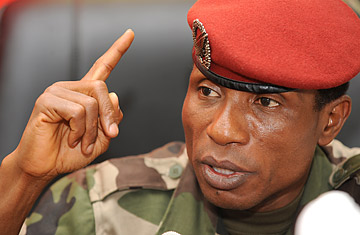
Guinean leader Moussa Dadis Camara, in the capital of Conakry
Guinean leader Moussa Dadis Camara was little-known even in his own country before seizing control of the troubled West African nation in December following the death of its longtime dictator. The former junior military officer has vaulted to world prominence since the brutal massacre of his opponents by security forces on Sept. 28. Authorities shot, stabbed and beat protesters who were assembled at a stadium in the capital of Conakry, killing 157 people and injuring more than 1,000. Witnesses said scores of women were sexually assaulted and raped by soldiers. Camara, 45, has not accepted responsibility for the bloody crackdown, saying the rally "had the character of wanting to overthrow a chief of state." The leader once affectionately called Obama Junior has scheduled elections for January; though he at first promised not to stand as a candidate, he now refuses to rule it out.
Fast facts:
• Born into a farming family in the village of Koure. Studied law and economics at Abdel Nasser University in Conakry.
• Joined the army in 1990, serving as head of the fuel-supplies unit before taking control of the government on Dec. 24.
• After longtime Guinean President Lansana Conte died before grooming a successor, members of Guinea's military junta reportedly drew lots to decide who would become the nation's next leader. On Dec. 23, Camara's soldiers broke down the doors of the state TV station and broadcast that he was dissolving the constitution.
• Began his leadership on a positive note for Guinea, promising a war on drug traffickers and holding televised interrogations of his predecessor's corrupt associates.
• Known for wearing a red army beret, Camara runs his government from a military camp rather than government offices.
• Insists it is his right as a citizen to run for President in elections scheduled for Jan. 31, despite his previous assurances that the government would return to civilian control. Has reportedly told foreign diplomats he intends to be a candidate, which would contradict his earlier pledge. The African Union has threatened sanctions if he runs.
• Speaks German, having received several years of military training in Germany beginning in 1996. Often wears a German paratrooper badge on his beret.
• Governs erratically, keeping businessmen and officials waiting days for appointments and ordering mining firms to shut down only to permit them to reopen days later. Said the only reason he did not attend the bloody Sept. 28 rally was that he could not find the keys to his pickup truck.
Quotes from:
"We are patriots, not hungry for power. We don't intend to stay in power forever."
— Pledging not to stand for elections after seizing control of Guinea's government (France 24, Dec. 25, 2008)
"I have been given a chance to guide the destiny of the nation. I have a sacred mission not to betray the nation."
— Delivering assurances after the military coup (TIME.com, Dec. 26, 2008)
"I run an army, but faced with unpredictable and uncontrollable events, not even the head of state can exercise discipline."
— Refusing to accept responsibility for the stadium massacre (Radio France Internationale, Sept. 29, 2009)
"Whatever you want, at whatever time. On my tab, as chief of state."
— Offering to send reporters covering the massacre to Conakry nightclubs, in an apparent bid to win their favor (New York Times, Oct. 2, 2009)
Quotes about:
"This is a blatant violation of the Guinean constitution and a violation of African legality."
— African Union peace and security commissioner Ramtane Lamamra, following Camara's rise to power (BBC.com, Dec. 23, 2008)
"He is cleaning up the country like only a soldier can. I support him. He should stay in power as long as it takes to finish the job."
— Ousmane Sow, a carpenter and one of many who supported Camara in the early days of his rule (New York Times, March 18, 2009)
"These people are not interested in democracy. They are interested in pillaging the country."
— Sidya Toure, an opposition leader and former Guinean Prime Minister (New York Times, Oct. 2, 2009)
"It's difficult to understand, all this violence. It shows a determination of the military to remain in power, and to destroy all resistance."
— Bakary Fofana, a civil-society advocate, on the massacre (New York Times, Sept. 29, 2009)
"We were appalled and outraged by the recent violence in Guinea. The indiscriminate killing and raping ... by government troops was a vile violation of the rights of the people of that country."
— U.S. Secretary of State Hillary Clinton (Reuters, Oct. 6, 2009)
